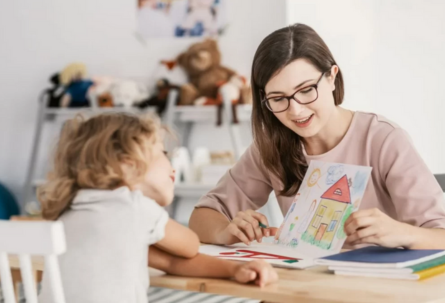Success Story: How a Psycho-educational Evaluation Helped A Student Get the Support Needed for ADHD Inattentive Type
Meet Max* (name changed for confidentiality reasons), a bright and curious 9-year-old who always had a million questions about everything. From space to dinosaurs to how his favorite video games were made, Max’s brain was always buzzing with ideas. But in the classroom, things weren’t going as smoothly. Despite his intelligence, Max was often lost in a daydream, struggled to stay focused during lessons, and had a tough time finishing assignments on time. His teachers noticed that, while he had potential, he was falling behind, especially in reading and math.
Max’s parents were frustrated. They knew how smart and capable he was, but they couldn’t figure out why school seemed like such a struggle. His homework came home incomplete, and parent-teacher meetings often centered on how Max "just wasn’t paying attention" or "seemed distracted." That’s when Max’s parents decided to pursue a Psychoeducational Evaluation to get to the bottom of what was going on.
The Psycho-educational Evaluation: Uncovering ADHD Inattentive Type
After meeting with a school psychologist from our team, Max went through a series of assessments as part of his psycho-educational evaluation. The tests evaluated his cognitive abilities, academic achievement, attention, memory, and processing speed. The psychologist also collected input from Max’s teachers and parents about his behavior at school and home.
The results were eye-opening. Max was diagnosed with ADHD inattentive type—a form of ADHD where kids have trouble focusing, staying organized, and following through on tasks, but without the hyperactivity that people usually associate with ADHD. Max’s brain wasn’t lacking in intelligence, but it needed some extra support to stay focused and organized in the classroom.
How the School Intervened: Max’s New Learning Plan
With Max’s ADHD diagnosis in hand, the school quickly jumped into action to provide him with the support he needed. Here are some of the key interventions that were put in place to help Max stay on track:
1. Preferential Seating & Proximity Control
Max was seated at the front of the classroom. Being closer to the teacher helped him stay focused and more engaged during lessons. Also, his teacher would slightly touch his shoulder to help redirect him to stay focused.
2. Chunking Assignments
Instead of giving Max one large assignment and expecting him to complete it all at once, his teacher began breaking down tasks into smaller, more manageable chunks. This allowed Max to focus on one step at a time, reducing his overwhelm and making it easier for him to complete his work.
3. Extended Time for Tests and Assignments
Because Max had trouble focusing for long periods, his teachers allowed him extra time to complete tests and assignments. This took away the pressure of having to rush, giving him the space he needed to process information at his own pace.
4. Graphic Organizer
Max started using graphic organizers to help him to stay focused on reading lengthy passages. Instead of looking at long passages, he now had a creative way of staying engaged and interested in the passages.
5. Visual and Auditory Cues
Max’s teacher introduced visual aids like checklists and timers to help him stay on task. These cues served as gentle reminders to refocus, and Max quickly learned how to use them to manage his own time. Verbal reminders during lessons also helped bring Max’s attention back when his mind wandered.
5. Regular Check-ins and Encouragement
Max’s teacher started doing regular check-ins with him throughout the day to ensure he was staying on task. These weren’t punitive but were more like gentle nudges to help Max stay engaged and accountable. Positive reinforcement, like praise or small rewards for completing assignments, helped boost his confidence and motivation.
6. An Organized Learning Space
At school and at home, Max benefited from having an organized, clutter-free workspace. His desk was kept clear of distractions, and his parents worked with him to create a simple organizational system for his school supplies and homework assignments.
The Transformation: Max’s Newfound Confidence and Success
Within a few months of implementing these interventions, Max’s transformation was remarkable. He was no longer the daydreamer who constantly got lost in class. Instead, he became more engaged, began completing his assignments on time, and his grades improved dramatically. He even started raising his hand to participate in class discussions—a huge change for a kid who used to zone out during lessons.
Most importantly, Max’s confidence grew. Instead of feeling frustrated and “different” from his classmates, he now had the tools to succeed and stay on top of his schoolwork. His parents noticed he was less anxious about school, and homework time at home became much smoother. Max no longer dreaded sitting down to work because he had strategies that helped him stay organized and focused.
Final Thoughts:
How a Psycho-educational Evaluation Made All the Difference
For Max, the psychoeducational evaluation was a turning point. It didn’t just label him—it gave him and his family insight into why he was struggling and what specific interventions would help him thrive. By diagnosing ADHD inattentive type, the evaluation helped the school put in place targeted strategies that played to Max’s strengths while addressing his challenges.
Today, Max continues to excel in school, with the right support system helping him stay focused and organized. The psychoeducational evaluation didn’t just change his academic performance—it changed his whole outlook on learning and gave him the tools he needed to succeed.
If your child is showing signs of difficulty focusing or keeping up with schoolwork, a psychoeducational evaluation might be the key to unlocking their potential—just like it did for Max!
*Max: named changed to maintain client confidentiality
Schedule a free consult today to find out the best type of psycho-educational evaluation to get for your child. Also, check out the blog on the Top 10 Signs Your Child Needs A Psycho-Educational Evaluation
The Mind Center, LLC is a thought leadership mental health brand dedicated to helping parents, their kids, and the schools they attend. At The Mind Center LLC, we specialize in psycho-educational evaluations and offer a range of services to support children. Contact us today.





